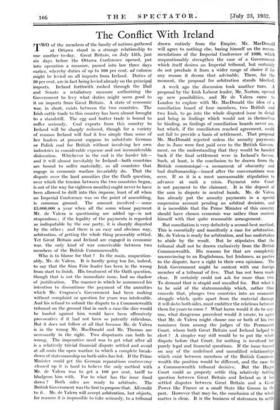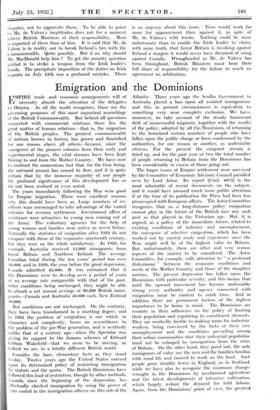The Conflict With Ireland T wo of the members of the
family of nations gathered at Ottawa stand in a strange relationship to one another to-day. Great Britain, on July 15th, just six days before the Ottawa Conference opened, put into operation a measure, passed into law three days earlier, whereby duties of up to 100 per cent, ad valorem might be levied on all imports from Ireland. Duties of 20 per cent. are in fact being levied already on the principal imports. Ireland forthwith rushed through the Dail and Senate a retaliatory measure authorizing the Government to levy what duties might seem good to it on imports from Great Britain. A state of economic war, in short, exists between the two countries. The Irish cattle trade to this country has been almost brought to a standstill. The egg and butter trade is bound to suffer seriously. Coal exports from this country to Ireland will be sharply reduced, though for a variety of reasons Ireland will find it less simple than some of her leaders at present suppose to substitute German or Polish coal for British without involving her own industries in considerable expense and not inconsiderable dislocation. Whichever in the end is the harder hit— and it will almost inevitably be Ireland—both countries are bound to suffer materially, as all countries that engage in economic warfare invariably do. That the dispute over the land annuities (for the Oath question, over which the tension between the two countries began, is out of the way for eighteen months) ought never to have been allowed to drift into this impasse, least of all when an Imperial Conference was on the point of assembling, is common ground. The amount involved — some £5,000,000 a year when all the sums whose payment Mr. de Valera is questioning are added up—is not stupendous ; if the legality of the payments is regarded as indisputable by the one party, it is sharply disputed by the other ; and there is an easy and obvious way, arbitration, of getting the whole thing peaceably settled. Yet Great Britain and Ireland are engaged in economic war, the only kind of war conceivable between two members of the British Commonwealth.
Who is to blame for that ? In the main, unquestion- ably, Mr. de Valera. It is hardly going too far, indeed, to say that the Sinn Fein leader has been in the wrong from start to finish. His treatment of the Oath question, though that is not the immediate issue, had no shadow of justification. The manner in which he announced his intention to discontinue the payment of the annuities which Mr. Cosgrave's Government had been making without complaint or question for years was intolerable. And his refusal to submit the dispute to a Commonwealth tribunal on the ground that in such a case the dice would be loaded against him would have been offensively provocative if it had not been so patently ridiculous.
• But it does not follow at all that because Mr. de Valera is in the wrong Mr. MacDonald and Mr. Thomas are necessarily in the right. Two disputants can both be wrong. The imperative need was to get what after all is a relatively trivial financial dispute settled and avoid at all costs the open warfare to which a complete break- down of statesmanship on both sides has led. If the Prime Minister could get the German reparations controversy cleared up it is hard to believe the only method with Mr. de Valera was to get a 100 per cent. tariff to bludgeon him with. For to what has the issue fined down ? Both sides are ready to arbitrate. The British Government was the first to propose that. All credit ;to Mr. de Valera will accept, arbitration, but objects, for reasons it is impossible to take seriously, to a tribunal drawn entirely from the Empire. Mr. MacDonald will agree to nothing else, basing himself on the recom. mendations of the Imperial Conference of 1980, which unquestionably strengthen the case of a Government which itself desires an Imperial tribunal, but certainly do not preclude it from a wider range of choice ; if for any reason it deems that advisable. There, for the moment, the proposal for arbitration stands blocked.
A week ago the discussion took another turn. A proposal by the Irish ,Labour leader, Mr. Norton, opened up new possibilities, And Mr de Valera came to London to explore with Mr. MacDonald the idea of a conciliation board of four . members, two British and two Irish, to go into the whole disputed issue in detail and bring in findings which would not in themselves be binding, as findings of conciliation boards never are, but which, if the conciliators reached agreement, could not fail to provide a basis of settlement. - That proposal Mr. MacDonald rejected unless the annuity payments due in June were first paid over to the British Govern- ment, on the understanding that they would be handed back if the final settlement were in Ireland's favour. Such, at least, is the conclusion to be drawn from the British communiqué—a- monument of obscurity and bad draftsmanship—issued after the conversations were over. If so it is a most unreasonable stipulation to advance at such a crisis. Payment into Court is not payment to the claimant. It is the deposit of the sum in dispute in -neutral hands. Mr. de Valera has already put the annuity payments in a special suspension account pending an arbitral decision, and it is incredible that the Prime Minister of this country should have chosen economic war rather than content himself with that quite reasonable arrangement.
But conciliation is very definitely a second-best method. This is essentially and manifestly a case for arbitration. Mr. de Valera is ready for arbitration, and has undertaken to abide by the result. But he stipulates that the tribunal shall not be drawn exclusively from the British Commonwealth. His reasons for that are completely unconvincing to an Englishman, but Irishmen, as parties to the dispute, have a right to their own opinions. The Irish Government might be content with one foreign member of a tribunal of five. That has not been made clear. It certainly could not ask for more than two. To demand that is stupid and uncalled for. But what is to be said of the statesmanship which, rather than concede that, plunges two countries into an economic struggle which, quite apart from the material damage it will do to both sides, must embitter the relations between them for years to come ? What- harm would it do to any- - one, what dangerous precedent would it 'create, to agree that Mr. de Valera might choose one or both of his two • nominees from among the judges of the Permanent Court, whom both Great Britain and Ireland helped to elect ? A simpler way still would be to put the whole dispute before that Court, for nothing is involved but purely legal and financial questions. If the issue-turned on any of the undefined and uncodified • relationships which exist between members of the British Common- wealth the position would be different, and the case for a Commonwealth tribunal decisive. But the Hague Court could as properly settle this relatively trifling question between Great Britain and Ireland as it has settled disputes between Great Britain and a Great Power like France or w small State like Greece in the -past.- However that may. be the conclusion of the -whole matter is clear. It is the business of statesmen to settle disputes, not to aggravate them. To be able to point to Mr. de Valera's ineptitudes does not for a moment relieve British Ministers of their responsibility. More is expected of them than of him. It is said that Mr. de Valera is in reality out to break Ireland's ties with the Commonwealth. Quite possibly. But if so, why should Mr. MacDonald help him ? To get the annuity question settled is to strike a weapon from the Irish leader's hands. The precipitate imposition of the duties on Irish imports on July 15th was a profound mistake. There is no urgency about this issue. Time would work far more for appeasement than against it, in spite of Mr. de Valera's wild words. Nothing could be more unfortunate than to enable the Irish leader to claim, with some truth, that Great Britain is invoking against Ireland a weapon it would never have dreamed of using against Canada. Wrongheaded as Mr. de Valera has been throughout, British Mthisters must bear their full share of responsibility for the failure to reach an agreement on arbitration.















































 Previous page
Previous page